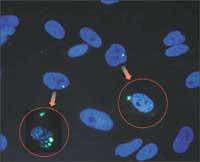The cell does not solve all fractures
X-ray radiation breaks the DNA chains. The higher the dose, the more. And it repairs the cells equally.

Researchers at the Saarland University of Germany have discovered that when there are many breaks, the cells get fixed quickly, but when few are not. When the number of breaks is about one in ten cells, the repair is interrupted. In addition, they discover that cells with fractures die when excited to divide.
This number of fractures is equivalent to those that occur with very small doses of radiation, for example in performing X-rays. However, according to German researchers, the finding does not mean that small doses of X-rays are especially bad for health, since the damage is small. Researchers consider this mechanism to be entirely logical.
Due to the small number of affected cells, it is logical that an organism does not repair all the fractures, since in many cases there are errors in the repair mechanism, so it is safer to kill a few cells.





